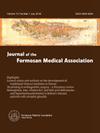台湾大学生群体中多动症症状与酗酒之间的创伤后应激障碍中介模型。
IF 2.6
3区 医学
Q1 MEDICINE, GENERAL & INTERNAL
引用次数: 0
摘要
目的:冲动、注意力不集中、童年创伤、创伤后应激障碍和抑郁症状是ADHD症状中酗酒的高危因素。目前还缺乏一个全面的框架来解释ADHD症状中的创伤和创伤后应激障碍与酗酒的关系,从而解释为什么ADHD大学生会成为问题饮酒者:经知情同意后,从网络平台(如Facebook、LINE或Google)招募了521名大学生(女性,67.9%,n = 354;平均年龄= 20.34,S.D. = 1.98)。他们都填写了调查问卷,其中包括多动症症状、注意力不集中和冲动、抑郁症状、童年创伤、创伤后应激障碍症状和问题性饮酒。我们采用单因素方差分析和路径分析来检验八条路径的显著性:结果:我们的研究结果支持童年创伤和创伤后应激障碍症状在多动症症状与问题性饮酒之间的中介效应:讨论:复杂创伤后应激障碍在冲动性和问题性饮酒之间的影响尚不清楚。除了冲动和注意力不集中对伴有问题性饮酒的多动症状的影响外,还需要考虑多动的影响:结论:对伴有酗酒的多动症状的有效治疗今后可侧重于自我控制训练和情绪调节。本文章由计算机程序翻译,如有差异,请以英文原文为准。
The mediated model of PTSD between ADHD symptoms and alcohol abuse in a population of college students in Taiwan
Purpose
Impulsivity, inattention, childhood trauma, PTSD, and depressive symptoms were the high-risk factors of alcohol abuse in ADHD symptoms. There is a lack of a comprehensive framework of trauma and PTSD in ADHD symptoms with alcohol abuse to explain why ADHD college students become problematic alcohol drinking.
Method
521 college students were recruited from online platforms (e.g., Facebook, LINE, or Google) after informed consent (females, 67.9%, n = 354; averaged age = 20.34, S.D. = 1.98). All of them completed the questionnaires, which included symptoms of ADHD, inattention and impulsivity, depressive symptoms, childhood trauma, PTSD symptoms, and problematic alcohol drinking. One-way ANOVA and path analysis were applied to examine the significance of eight paths.
Results
Our results supported the mediating effects of childhood trauma and PTSD symptoms in ADHD symptoms with problematic alcohol drinking.
Discussion
The effect of complex PTSD between impulsivity and problematic alcohol drinking is still unclear. In addition to impulsivity and inattention to ADHD symptoms with problematic alcohol drinking, the impact of hyperactivity also needs to be considered.
Conclusion
Effective treatment for ADHD symptoms with alcohol abuse could focus on self-control training and emotional regulation in the future.
求助全文
通过发布文献求助,成功后即可免费获取论文全文。
去求助
来源期刊
CiteScore
6.50
自引率
6.20%
发文量
381
审稿时长
57 days
期刊介绍:
Journal of the Formosan Medical Association (JFMA), published continuously since 1902, is an open access international general medical journal of the Formosan Medical Association based in Taipei, Taiwan. It is indexed in Current Contents/ Clinical Medicine, Medline, ciSearch, CAB Abstracts, Embase, SIIC Data Bases, Research Alert, BIOSIS, Biological Abstracts, Scopus and ScienceDirect.
As a general medical journal, research related to clinical practice and research in all fields of medicine and related disciplines are considered for publication. Article types considered include perspectives, reviews, original papers, case reports, brief communications, correspondence and letters to the editor.

 求助内容:
求助内容: 应助结果提醒方式:
应助结果提醒方式:


